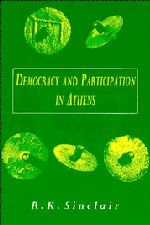Book contents
- Frontmatter
- Contents
- Preface
- Maps
- 1 The Athenian polis and the evolution of democracy
- 2 The privileges and the opportunities of the citizen
- 3 The responsibilities of the citizen
- 4 The sovereignty of the Demos, officials and the Council
- 5 Citizens and participation
- 6 The hazards of leadership
- 7 The rewards of leadership
- 8 The critics of Athenian democracy
- Appendix 1 The population of Athens
- Appendix 2 ‘Working days’
- Appendix 3 Notes on three constitutional matters
- Bibliography
- Index
7 - The rewards of leadership
Published online by Cambridge University Press: 01 June 2011
- Frontmatter
- Contents
- Preface
- Maps
- 1 The Athenian polis and the evolution of democracy
- 2 The privileges and the opportunities of the citizen
- 3 The responsibilities of the citizen
- 4 The sovereignty of the Demos, officials and the Council
- 5 Citizens and participation
- 6 The hazards of leadership
- 7 The rewards of leadership
- 8 The critics of Athenian democracy
- Appendix 1 The population of Athens
- Appendix 2 ‘Working days’
- Appendix 3 Notes on three constitutional matters
- Bibliography
- Index
Summary
The rewards and the hazards: three contemporaries
Compared with the hazards of active participation in the public life of Athens, what benefits accrued to the individuals themselves or to the Athenian community of citizens from such participation? At the individual level, it may be useful first to identify the rewards and the hazards by a consideration of the careers of three ambitious Athenians who were near-contemporaries and, in particular, by an examination of the means employed by them to advance themselves and to protect themselves against attack. Their probable dates of birth were: Iphikrates c. 418 (but perhaps as late as 413), Kallistratos not later than 415, and Timotheos 414 or earlier. And all three had achieved some public fame in their twenties – at an early age by Athenian standards.
Iphikrates was the son of a shoemaker and was conscious of his humble origins. Kallistratos was the nephew of Agyrrhios, who in the 390s proposed the introduction of pay for attending the assembly, had been active in public affairs since at least 405, and was a strategos in 388/7. Kallistratos' wealth was such that in the 360s, and probably well before, he was liable for liturgies and served as a trierarch. In 392/1 Kallistratos took his first known political step when he successfully prosecuted the envoys who were sent to Sparta to discuss peace. Agyrrhios' public debt and imprisonment may have played a part in the lull in political activity by Kallistratos in the 380s, if the silence of the sources may be so interpreted.
- Type
- Chapter
- Information
- Democracy and Participation in Athens , pp. 163 - 190Publisher: Cambridge University PressPrint publication year: 1988

